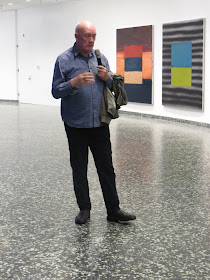Sean Scully at the opening of Sean Scully: Landlines, Hirshhorn Museum and Sculpture Garden, Washington, D.C., Sept.12, 2018/Photo by Patricia Leslie
Dear All,
If the Trump shutdown or other reason caused you to miss the fabulous exhibit, Sean Scully: Landline, at the Hirshhorn Museum and Sculpture Garden, please see images here of the show and of the artist who came to town for the opening and to talk about his art.
The Landline series made its U.S. debut at the Hirshhorn after appearing at the Venice Biennale in 2015.
Sean Scully with his Landline: Bend Triptych, 2017, private collection, at the opening of Sean Scully: Landlines, Hirshhorn Museum and Sculpture Garden, Washington, D.C., Sept. 12, 2018/Photo by Patricia Leslie
Sean Scully at the opening of Sean Scully: Landlines, Hirshhorn Museum and Sculpture Garden, Washington, D.C., Sept. 12, 2018/Photo by Patricia Leslie
Sean Scully, Stack Blues, 2017, private collection, at the Hirshhorn Museum and Sculpture Garden, Washington, D.C./Photo by Patricia Leslie
Sean Scully, Landline Baltic, 2018, Landline Far Blue Lake, 2018, and Untitled (Landline), 2016, all loaned by private collectors, at the Hirshhorn Museum and Sculpture Garden, Washington, D.C./Photo by Patricia Leslie
Mr. Scully is quoted at Wikipedia in a 2005 article by Joao Ribas:
I hold to a very Romantic ideal of what's possible in art, and I hold to the idea of the 'personal universal.' This is a complex agenda. My project is complicated in this way, and in that sense I'm out of fashion. I'm going against the current trend towards bizarreness, oddness; as you just called it, the 'esoteric', which of course was around in the 1930s. That's what is being revisited now. In between the two great wars, there was a very strong period, particularly in Europe, of a strange, bizarre, distorted and perverse kind of figuration, with freaks in the paintings. Very disturbing twins, subjects like that. These paintings were mostly coming out of Italy and Germany. Now we have a return to that—again in a strange period, after the end of Modernism.Sean Scully, Landline Blue Red, 2016, private collection, at the Hirshhorn Museum and Sculpture Garden, Washington, D.C./Photo by Patricia Leslie
Sean Scully, Landline Orient, 2017, private collection, at the Hirshhorn Museum and Sculpture Garden, Washington, D.C./Photo by Patricia Leslie
Sean Scully, Horizon Nine, 2013, private collection, at the Hirshhorn Museum and Sculpture Garden, Washington, D.C./Photo by Patricia Leslie
Sean Scully, Landline 5.20.15, 2015, private collection, at the Hirshhorn Museum and Sculpture Garden, Washington, D.C./Photo by Patricia Leslie
At his website, Mr. Scully outlines his life in years: He was born in 1945 in Dublin and grew up in a working class neighborhood in London. He attended Catholic schools and was influenced by the paintings he saw in parishes. As a boy, he wanted to become an artist.
When he was a teenager, he became interested in American rhythm and blues and started a music club. He continues to love popular music.
Sean Scully with his Stack Colors, 2017, private collection, at the Hirshhorn Museum and Sculpture Garden, Washington, D.C., Sept.12, 2018/Photo by Patricia Leslie
Sean Scully at the opening of Sean Scully: Landlines, Hirshhorn Museum and Sculpture Garden, Washington, D.C., Sept. 12, 2018/Photo by Patricia Leslie
Sean Scully at the opening of Sean Scully: Landlines, Hirshhorn Museum and Sculpture Garden, Washington, D.C., Sept.12, 2018/Photo by Patricia Leslie
Sean Scully at the opening of Sean Scully: Landlines, Hirshhorn Museum and Sculpture Garden, Washington, D.C., Sept. 12, 2018/Photo by Patricia Leslie
Sean Scully at the opening of Sean Scully: Landlines, with Melissa Chiu, Hirshhorn director, and Stéphane Aquin, chief curator, Hirshhorn Museum and Sculpture Garden, Washington, D.C., Sept.12, 2018/Photo by Patricia Leslie
Vincent van Gogh, Van Gogh's Chair, 1888/www.VincentVanGogh.org
At age 21, Mr. Scully "decides to dedicate himself entirely to art studies" and continues art classes.
He was 28 when, at his first solo show in London, every piece sold, Four years later New York City was the venue for his first solo exhibition in the U.S. In 1983 his 19-year-old son, Paul, died in a car accident, the same year Mr. Scully became an American citizen.
In 2015 when the Landline series was featured at the Venice Biennale, Mr. Scully was honored by the Chinese as the first western artist to enjoy a major retrospective there.
Melissa Chiu, the Hirshhorn director calls him "one of the most influential painters working today" and curator Stéphane Aquin comments that Mr. Scully's style stems from abstract expressionism, "inspired by personal memories" of his growing up years in Ireland, especially his time, the Hirshhorn says, "looking out to sea."
Landline next travels to the Wadsworth Atheneum Museum of Art in Hartford, Connecticut where it opens February 23, 2019.
Sandy Guttman provided curatorial assistance at the Hirshhorn. A catalogue is available.
patricialesli@gmail.com















No comments:
Post a Comment